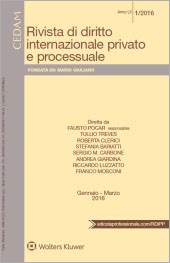The end of fostering outdated injustice to children born outside marriage through reparation of Nazi-expatriation acts: Ruling of the German Constitutional Court of 20 May 2020 (2 BvR 2628/18)
Marie-Luisa Loheide is a doctoral candidate at the University of Freiburg who writes her dissertation about the relationship between the status of natural persons in public and private international law. She has kindly provided us with her thoughts on a recent ruling by the German Constitutional Court.
According to Article 116 para. 2 of the German Basic Law (Grundgesetz – GG), every descendant of former German citizens of Jewish faith who have been forcibly displaced and expatriated in a discriminatory manner by the Nazi-regime is entitled to attain German citizenship upon request. This rule has been incorporated in the Basic Law since 1949 as part of its confrontation with the systematic violations of human rights by the Nazi-regime and is therefore meant to provide reparation by restoring the status quo ante.
Descendants (“Abkömmlinge”) as referred to in Article 116 para. 2 are children, grandchildren and all future generations without any temporal constraint. Regardless of their parents’ choice of citizenship, they have a personal right to naturalisation which is exercised upon request by reactivation of the acquisition of citizenship iure sanguinis. This very wide scope is legitimated by the striking injustice done by the Nazi-regime. Yet, according to the settled case law of the Federal Administrative Court, it had been limited by a strict “but-for” test: in order to solely encompass those people affected by this specific injustice. This meant that the descendant must hypothetically have possessed German citizenship according to the applicable citizenship law at the time of its acquisition which is usually the person’s birth. To put it more clearly, one had to ask the following hypothetical question: Would the descendant be a German citizen if his or her ancestor had not been expatriated by the Nazis?
Exactly this limiting prerequisite was the crucial point of the matter decided upon by the German Constitutional Court on 20 May 2020. In the underlying case, the hypothetical question described above would have had to be answered in the negative: Until its revocation in 1993, German citizenship law stated that children of an unmarried German father and a mother of other citizenship did not acquire the German citizenship of their father but only that of their mother, contrary to today’s principle of ius sanguinis-acquisition. As in casu the daughter of a forcibly displaced and expatriated former German emigrant of Jewish faith and a US-American mother was born outside marriage in 1967, she was denied the acquisition of the German citizenship. Whereas this was not criticised by the administrative courts seised, the German Constitutional Court in its ruling classified the denial as an obvious violation of the principle of equal treatment of children born within and outside marriage underlying Article 6 para. 5 GG as well as the principle of equal treatment of women and men according to Article 3 para. 2 GG, as alleged by the plaintiff. In its reasoning, the Court emphasised that an exception from the principle of equal treatment of children born outside marriage could only be made if absolutely necessary. This corresponds to the case-law of the European Court of Human Rights on Article 14 of the ECHR that a difference in treatment requires “very weighty reasons”. The former non-recognition of the family relationship between an unmarried father and his child, however, did obviously contradict the stated constitutional notion without being justified by opposing constitutional law. Out of two possible interpretations of “descendant” as referred to in Article 116 para. 2 GG the court must have chosen the one that consorts best with the constitution. According to the Constitutional Court, the more generous interpretation of descendant also prevents a perpetuation of the outdated notion of inferiority of children born outside marriage through Article 116 para 2 GG and corresponds to its purpose of reparation.
As the notion of inferiority of children born outside marriage has fortunately vanished, a clarifying judgment was highly overdue and is therefore most welcome. It is not acceptable that outdated notions are carried to the present through a provision of the Basic Law that is meant to provide reparation of Nazi crimes. Especially in post-Brexit times, the question dealt with has become more and more urgent with respect to people reclaiming their German citizenship in order to maintain their Union citizenship and the rights pertaining to it (see here).
In regard to conflicts law, this clarification of a key question of citizenship law is relevant to the determination as a preliminary issue (incidental question or Vorfrage) when nationality is used as a connecting factor. The judgment is likely to lead to more cases of dual citizenship that are subject to the ambiguous conflicts rule of Art. 5 para. 1 sentence 2 EGBGB.
